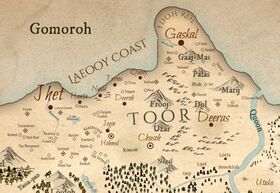Difference between revisions of "Toor"
| Line 16: | Line 16: | ||
"Toor" means "warrant" or rather "warrant granted through vision" in Jabi, and reflects the justification that many Tarnarian dynasties and clans have traditionally put forth for their rule. Based on the theology of [[Xaewoon]], a Toor is a warrant to lead people, because the ruler has special insight about the right path (the Xaewoon). | "Toor" means "warrant" or rather "warrant granted through vision" in Jabi, and reflects the justification that many Tarnarian dynasties and clans have traditionally put forth for their rule. Based on the theology of [[Xaewoon]], a Toor is a warrant to lead people, because the ruler has special insight about the right path (the Xaewoon). | ||
| − | The Dolysoh dynasty, that had founded and ruled Toor for most of its existence, placed much greater emphasis on the religious justification than the ruling families of [[Asdoh]] or [[Barud]] in the south. | + | The Dolysoh dynasty, that had founded and ruled Toor for most of its existence, placed much greater emphasis on the religious justification than the ruling families of [[Asdoh]] or [[Barud]] in the south. |
After the downfall of Toor at the end of the 1st CSR, [[Gened]] referred to [[Moroh|Mōroh]] as "the true Toor". With the establishment of [[Stogen]] in the 2nd CSR, nomadic kingdoms of Tarnaria began to refer to their kingdoms as [[Toor (political entity)|toors]]. | After the downfall of Toor at the end of the 1st CSR, [[Gened]] referred to [[Moroh|Mōroh]] as "the true Toor". With the establishment of [[Stogen]] in the 2nd CSR, nomadic kingdoms of Tarnaria began to refer to their kingdoms as [[Toor (political entity)|toors]]. | ||
Revision as of 22:58, 5 February 2021
| Toor | |
| Political details | |
|---|---|
| Capital | Chusoh |
| Government | Constitutional monarchy |
| Language | Bukk |
| Religion | Xaewoon |
| Historical details | |
| Established | c. 1770 FR |
| Disestablished | c. 75 SR |
Toor /tʊər/ was an early Tarnarian civilization that existed for three centuries at the end of the first and beginning of the second revolution. It became exceedingly wealthy due to its discovery, development and commercialization of mining.
Etymology
"Toor" means "warrant" or rather "warrant granted through vision" in Jabi, and reflects the justification that many Tarnarian dynasties and clans have traditionally put forth for their rule. Based on the theology of Xaewoon, a Toor is a warrant to lead people, because the ruler has special insight about the right path (the Xaewoon).
The Dolysoh dynasty, that had founded and ruled Toor for most of its existence, placed much greater emphasis on the religious justification than the ruling families of Asdoh or Barud in the south.
After the downfall of Toor at the end of the 1st CSR, Gened referred to Mōroh as "the true Toor". With the establishment of Stogen in the 2nd CSR, nomadic kingdoms of Tarnaria began to refer to their kingdoms as toors.
History
Toor was established at the end of the 18th century of the first revolution by Sopoh Dolysoh. Over the course of the next century, the Dolysoh dynasty has expanded Toor, eventually subjugating Laeooy Coast and the area which today is known as Commonground, while continuing to fight for its integrity against the Negy, the Oaleed and the Baruds in the south and the tribes from Teamatian in the west.
The rule of Dolysoh was overtaken by the Tōrmoh clan in the beginning of the second revolution, and King Tōrmoh managed to finally defeat the Negy and displace Oaleed to the south of Mantar hill.
The state of Toor came to an end circa 75 SR when Keetoh and Gened started the serf uprising and established Commonground in 72 SR, which eventually led to the secession of Gaskal and Deeras and the economic and political downfall of Toor's capital Chusoh.
Toor was succeeded by the Five Kingdoms of Mōroh.

